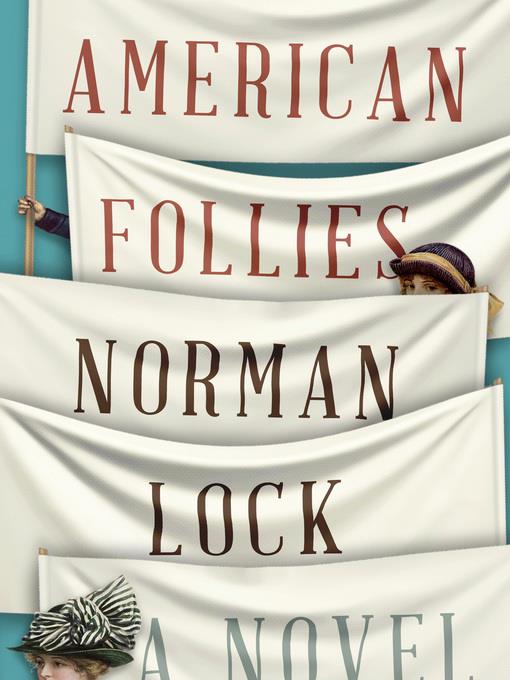
American Follies
The American Novels
- اطلاعات
- نقد و بررسی
- دیدگاه کاربران
نقد و بررسی

May 1, 2020
Lock's novel blends history and delirium in a thrilling, unnerving portrait of 19th-century America. The books in Lock's American Novels cycle--of which this is the seventh--have ranged from the wryly philosophical (A Fugitive in Walden Woods, 2017) to the metafictional (The Boy in His Winter, 2014). This book, which shares a few characters with Feast Day of the Cannibals (2019), both stands on its own and carves out a distinctive space--one part novel of ideas, one part madcap adventure. In an author's note at the end, Lock calls this novel's subject "America for the disenfranchised and powerless." And so the story follows one Ellen Finch, who goes to work for Susan B. Anthony and Elizabeth Cady Stanton in 1883. Ellen is pregnant when this new position begins, and halfway through the novel, she gives birth--at which point her newborn son vanishes. With the aid of P.T. Barnum, Ellen and her allies determine that the Ku Klux Klan is the responsible party, at which point the novel takes on a more stylized tone--one which echoes the occasional forays into fever-dream imagery in the book's first half. While Lock's focus is largely on 19th-century politics, there are a few moments that recall the current political scene--including one of a group of Klansmen shouting, "Build a wall! Build a wall to keep them out!" Lock juxtaposes critiques of racism and sexism with snappy dialogue: "In Mr. Barnum's opinion, twelve clowns should be sufficient to fluster a Grand Cyclops and turn a meeting of the Ku Klux Klan...upside down" is perhaps the most ornate example. Lock continues to experiment and push against narrative conventions.
COPYRIGHT(2020) Kirkus Reviews, ALL RIGHTS RESERVED.

May 15, 2020
Lock's latest fictional foray into American history finds the pregnant and desperate Ellen Finch, a secondary character in Lock's previous American Novels book, Feast Day of the Cannibals (2019), in the employ of Elizabeth Cady Stanton and Susan B. Anthony, now in Manhattan to complete their definitive history of the suffragist movement while Ellen's husband looks for work as a reporter in San Francisco. Narrating 20 years later, Ellen recounts her often fantastical, occasionally farcical, and febrile dream following the birth of her son, Martin, in 1884, and culminating in his seeming abduction and apparent sacrifice by the KKK. As is his forte, Lock guides Ellen through a series of encounters with notable figures of the day, including P.T. Barnum, Herman Melville, and Henry James, for whom Ellen once worked as a stenographer. Lock's facility with language and sharp ear make him a worthy mimic of the likes of the Master and other literary luminaries. Lock nimbly explores race, gender, and identity through a historical lens while displaying a joyous love of language.(Reprinted with permission of Booklist, copyright 2020, American Library Association.)

May 18, 2020
Lock’s raucous, fantastical seventh entry in his American Novel series (after Feast Day of the Cannibals) involves Susan B. Anthony and Elizabeth Cady Stanton on a search for a baby kidnapped by the KKK. Pregnant stenographer Ellen Finch, 27, secures a job as stenographer for the famous suffragists in 1883, when they are at work on their third volume of History of Woman Suffrage. Ellen endures Elizabeth and Susan’s one-upmanship and name calling (“Primp!” “Prude!” “Poseur!” “Prig!” “Humbug!” “Stickleback!”) and meets other notable figures such as Jacob Riis, Herman Melville, and performers from P.T. Barnum’s circus. Four months after the birth of Ellen’s son, Martin, he is taken by a member of the KKK, who claims the father is a black man passing as white and plans to kill him. Ellen, Elizabeth, and Susan borrow Barnum’s train to rush south on a surreal journey, complete with Stanton and Anthony dressed up as Klan members and later in blackface, and getting help from a jailer’s wife and a former slave in their desperate attempts to rescue the child. Lock captures the tone and language of the 19th century (“I composed a telegram with the laudatory terseness preferred by God for His pronouncements”), though the bizarre happenings are disorienting. This imaginative exploration of late-19th-century America’s cultural tensions is an amusing burlesque.

Starred review from July 1, 2020
Lock specializes in a subgenre of historical fiction in which historical characters implausibly interact, concocting situations that bore deep into the accumulated meaning of U.S. history--think Ragtime in a fever dream. In his latest novel, seventh in his "American Novels" series, a young woman who once served as Henry James's typist goes to work for Susan B. Anthony and Elizabeth Cady Stanton and becomes friendly with the troupe of freaks in P.T. Barnum's circus. At least two actual fever dreams ensue before the plot goes entirely surreal. It's here, ironically, that the novel's theme coalesces, as the group falls into the clutches of the KKK. It seems that when you mix 19th-century racists, feminists, misogynists, freaks, and a flim-flam man, the spectacle that results might bear resemblance to the contemporary United States. VERDICT Besides playing with historical figures and themes, Lock's novels stretch the limits of literary conventions. Those unfamiliar with the series may expect more reality with their history, but once you accept that the novel is a wild ride, hang on for the fun. Highly recommended, especially for readers of the series.--Reba Leiding, emerita, James Madison Univ. Lib., Harrisonburg, VA
Copyright 2020 Library Journal, LLC Used with permission.




دیدگاه کاربران